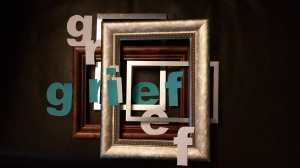Super Bowl 50 may be a big deal to some folks out there, but for those who are grieving it may or may not matter. If you have friends who’ve lost loved ones within the last couple of years (or so), keep in mind:
- Invite grieving friends to watch the big game at your house with you.

This is the kind of Super Bowl that gets watched at my house.
- If you and yours don’t watch the Super Bowl, invite your grieving friends to join you in whatever you do — or don’t.
- If you’re having a tailgating party, invite them there.
- Mourning leaves people feeling bronco-bucked. They may need to immerse themselves in occasional fun to escape their pain for a while.
- Grieving makes your friends feel panther-mauled. They may need to curl up in their dens to recover in solitude.
- Living after losing a loved one is harder than you know, so cut them a bit of slack. Mourners may need a replay or do-over.
- Crowds storm the field after the game, but eventually the stadium empties. Well-wishers surround the bereaved up until the funeral, but eventually everyone else goes home, leaving the bereaved alone in their loss.
- When you’ve lost the highest-stakes championship — with death on the line — getting riled up over a football game can seem pointless.
- Mourners need fans to cheer them on with encouragement and support — whether they seem ahead of their game or whether they seem to be running behind.
- After the game, the losing team needs fan support and continued training. After the funeral, bereaved friends need ongoing support, too.
- If you’ve already asked mourning friends to join you but they said, “No thanks,” ask again (GENTLY). Invite them to change their minds at any time.
- Honoring traditions (such as pre-game parties with friends) can make the bereaved feel more connected to their departed loved ones and their living friends.
- Honoring those same traditions can make the bereaved feel more disconnected from their dead loved ones and their living friends.
- Mourners can feel happy and involved with their friends while also feeling sad and isolated from their friends at the same time in the middle of a party.
- Not being invited because they’ve lost loved ones makes mourners feel like they’re being unfairly punished.
- Just because your friends have lost loved ones doesn’t mean they can’t laugh at funny things. Sometimes mourners need to laugh.
- Laughing while mourning can feel so good it makes you cry.
- If players are sidelined due to injuries, they need medical treatment but still belong to the team; if mourners are sidelined by grief, they’re still your friends — so treat them that way.
- Sometimes players’ numbers are retired, never to be worn again; people sometimes see that as sad, but the team carries on with new players signed on. Mourning friends’ loved ones have gone beyond retirement, never to play or work or interact again; their family team will never, ever be the same.
- Super Bowl teams train and work out long before they set foot on the televised field in front of the world. Whether mourner’s have advance notice of bereavement’s demands or they’re tackled by it without warning, grievers often feel vulnerable under spectators’ scrutiny.
- Mourners don’t need would-be coaches who’ve never mourned their loss telling them how to play through their grief.
- If you haven’t already asked your grieving friends to join you for the game, it’s not too late. (If you’re reading this after the game, it’s still not too late to get together doing something — anything — else!)
- Game day snacks might be the most wholesome meal your mourning friend has eaten since their loved one died. (Mourning appetites are weird.)
- Players sidelined with concussions are never told to get back out on the field to play again too soon. People concussed by the death of a life partner (or other loved one) should also never be told to get back out into relationship fields to play again too soon. (They’ll know when — and/or if — they’re ready again, so don’t give your input UNLESS they ask.)
- Tailgating means shopping ahead and prepping food before the big event; mourners may have trouble shopping or prepping food at all.
- Even if you don’t usually invite friends over for the Super Bowl, please invite your bereaved friends anyway. You don’t have to do anything fancy; just being there as a friend will help.
- Have a box of tissues nearby for commercials. Sometimes touching ads will touch off emotions of grief. Let your friends know you are okay with them expressing their feelings.
- Friends don’t let friends drive drunk (grieving or not). So don’t. Ever.
- Whether your friends lost their loved ones recently or long ago, keep in mind that annual events may strengthen and stir up traumatic losses.
- Last-minute invitations are better than no invitations at all. If you haven’t already done it, please, call, text, or message your grieving friends — NOW.
Whether you’re reading this hours or minutes before the big game, halfway through it, or long after, tell mourning friends you’re thinking of them. Acknowledge that even though they may feel alone, they aren’t forgotten and they don’t have to be alone all the time.
Let them know you care.





